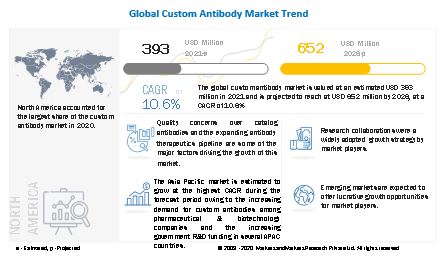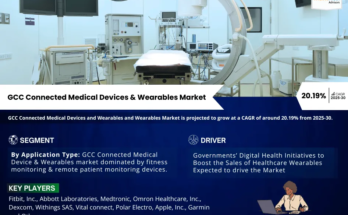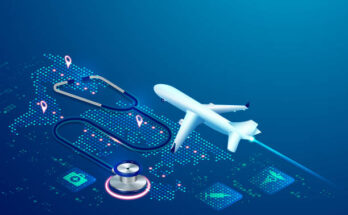As such, an increase in research activity-especially in the life sciences industry-along with growing industry-academia collaborations are the primary growth drivers for this market. In addition, the objective behind custom antibody production is to acquire an antibody that performs well in a particular qualitative or quantitative immunodetection method. The quality of catalog antibodies (to ensure the reproducibility of results) is also an area of concern in this market, which is primarily why end-users prefer custom-made antibodies.
[189 Pages Report] The global custom antibody market size is projected to reach USD 652 million by 2026 from USD 393 million in 2021, at a CAGR of 10.6% during the forecast period.
Download PDF Brochure:
https://www.marketsandmarkets.com/pdfdownloadNew.asp?id=164328301
Antibody Development accounted for the largest share of custom antibody market
Based on service, the custom antibody market is segmented into antibody development, antibody production & purification, and antibody fragmentation & labeling. Antibody development services accounted for the largest market share of 56.6% in 2020. The large share of this segment can be attributed to the increasing focus of researchers on high-quality antibodies for reproducibility, which can be hampered by using commercially available antibodies.
Monoclonal antibody accounted for the largest share of custom antibody market
Based on type, the custom antibody market is segmented into monoclonal antibodies, polyclonal antibodies, recombinant antibodies, and other custom antibodies. The recombinant antibodies segment is projected to witness the highest growth rate during the forecast period. The increasing development of recombinant antibodies due to advantages such as batch-to-batch reproducibility and rapid production is propelling the growth of this market segment.
Pharmaceutical & biotechnology companies is the fastest-growing end user segment of the custom antibody market
Based on end user, the custom antibody market is segmented into pharmaceutical & biotechnology companies, academic & research institutes, and contract research organizations. The pharmaceutical & biotechnology companies segment held the largest share of the custom antibody market in 2020. The large share of this segment is attributed to the increasing demand for high-specificity antibodies for drug discovery and development, increasing research in the areas of genomics and proteomics, and the need for antibodies in the identification of new targets and assays. Additionally, the impact of COVID-19 has encouraged various pharmaceutical companies to enter into collaborations with custom antibody service providers to develop COVID-19 antibodies.
Request For Sample:
https://www.marketsandmarkets.com/requestsampleNew.asp?id=164328301
Key Market Players
Thermo Fisher Scientific, Inc. (US), Bio-Rad Laboratories, Inc. (US), Merck Group (Germany), Cell Signaling Technology, Inc. (US), GenScript (China), BioLegend (US), Rockland Immunochemicals (US) are the prominent players operating in the custom antibody market.
Driver: Increasing research activities and funding
The R&D sector has conventionally remained capital-intensive due to long development periods and approval cycles. R&D investment occupies a prime position in global expenditure. Governments recognize R&D as a crucial investment for a nation’s progress, international competitiveness, and public benefit. Due to this, R&D expenditure and funding witnessed a steady increase over the years. According to the R&D Magazine (2020), in 2021, USD 2.5 trillion will be invested in R&D industries, government labs, and academic research centers across more than 115 countries. The R&D spending across the globe witnessed a drastic change due to the sudden outbreak of the COVID-19 pandemic. Various countries witnessed a massive decline in their respective R&D expenditures in 2020. On the other hand, China witnessed a historic R&D investment of 10.0% of its annual growth. The R&D shares of the top 10 countries in 2020 totaled 79.2%, and this figure is expected to remain the same in 2021. Currently, the rising demand for efficient therapeutic drugs with fewer side effects has led to an increasing focus on the R&D of biopharmaceuticals.



